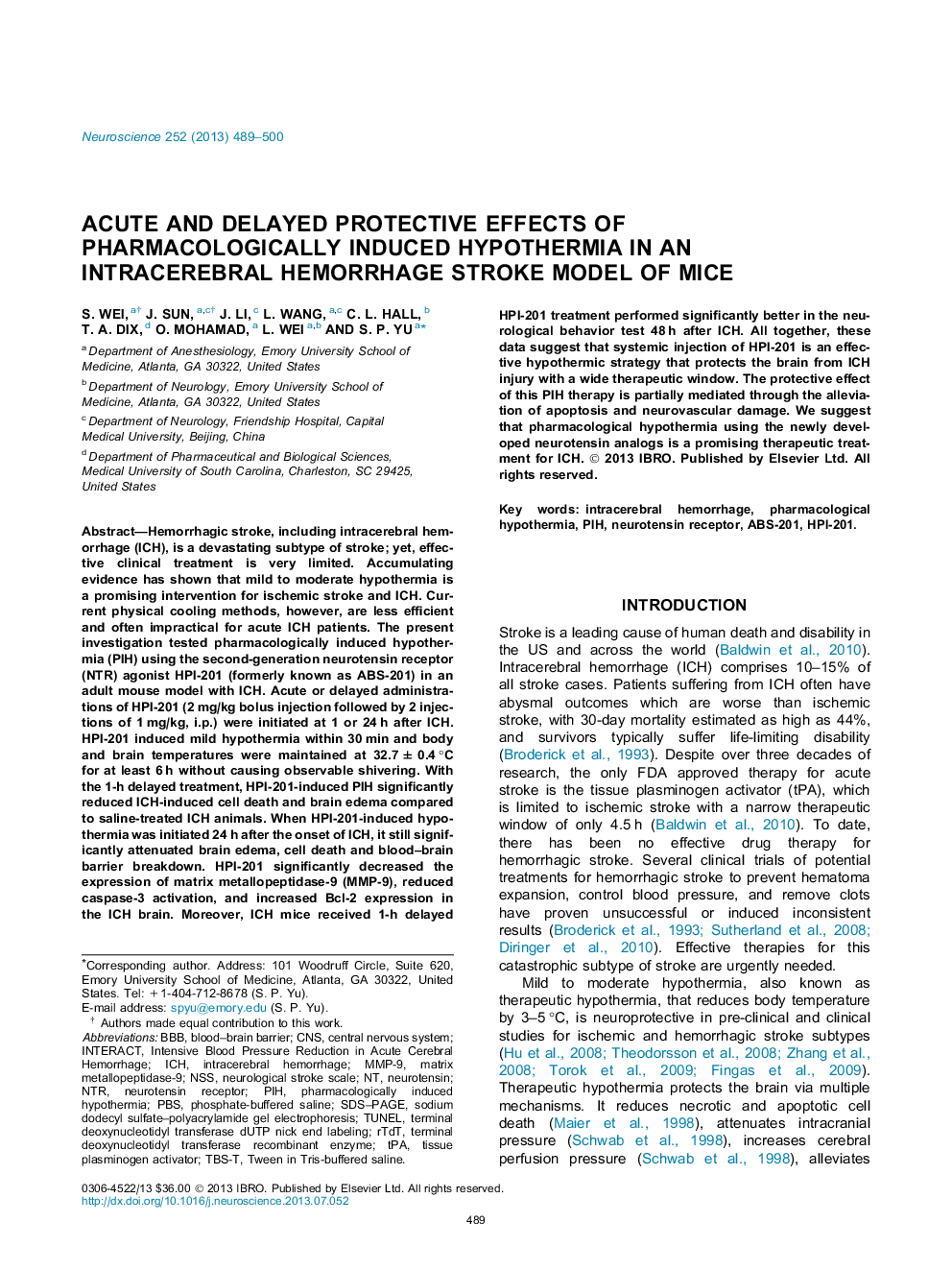| کد مقاله | کد نشریه | سال انتشار | مقاله انگلیسی | نسخه تمام متن |
|---|---|---|---|---|
| 4337834 | 1614824 | 2013 | 12 صفحه PDF | دانلود رایگان |
عنوان انگلیسی مقاله ISI
Acute and delayed protective effects of pharmacologically induced hypothermia in an intracerebral hemorrhage stroke model of mice
دانلود مقاله + سفارش ترجمه
دانلود مقاله ISI انگلیسی
رایگان برای ایرانیان
کلمات کلیدی
TBS-TrTdTNTRPIHNSSPBSMMP-9tPASDS–PAGE - SDS-PAGEsodium dodecyl sulfate–polyacrylamide gel electrophoresis - الکتروفورز ژل دوده سولفات سدیم پلی آکریل آمیدTerminal deoxynucleotidyl transferase dUTP nick end labeling - ترمینال deoxynucleotidyl transferase dUTP نام نهایی پایان نامهInteract - تعاملTUNEL - تونلintracerebral hemorrhage - خونریزی داخل مغزیCNS - دستگاه عصبی مرکزیBlood–brain barrier - سد خونی مغزیBBB - سد خونی مغزیcentral nervous system - سیستم عصبی مرکزیtissue plasminogen activator - فعال کننده بافتی پلاسمینوژنmatrix metallopeptidase-9 - ماتریکس متالوپپتیداز -9Phosphate-buffered saline - محلول نمک فسفات با خاصیت بافریICH - منneurotensin - نوروتنسینNeurotensin receptor - گیرنده Neurotensin
موضوعات مرتبط
علوم زیستی و بیوفناوری
علم عصب شناسی
علوم اعصاب (عمومی)
پیش نمایش صفحه اول مقاله

چکیده انگلیسی
Hemorrhagic stroke, including intracerebral hemorrhage (ICH), is a devastating subtype of stroke; yet, effective clinical treatment is very limited. Accumulating evidence has shown that mild to moderate hypothermia is a promising intervention for ischemic stroke and ICH. Current physical cooling methods, however, are less efficient and often impractical for acute ICH patients. The present investigation tested pharmacologically induced hypothermia (PIH) using the second-generation neurotensin receptor (NTR) agonist HPI-201 (formerly known as ABS-201) in an adult mouse model with ICH. Acute or delayed administrations of HPI-201 (2 mg/kg bolus injection followed by 2 injections of 1 mg/kg, i.p.) were initiated at 1 or 24 h after ICH. HPI-201 induced mild hypothermia within 30 min and body and brain temperatures were maintained at 32.7 ± 0.4 °C for at least 6 h without causing observable shivering. With the 1-h delayed treatment, HPI-201-induced PIH significantly reduced ICH-induced cell death and brain edema compared to saline-treated ICH animals. When HPI-201-induced hypothermia was initiated 24 h after the onset of ICH, it still significantly attenuated brain edema, cell death and blood-brain barrier breakdown. HPI-201 significantly decreased the expression of matrix metallopeptidase-9 (MMP-9), reduced caspase-3 activation, and increased Bcl-2 expression in the ICH brain. Moreover, ICH mice received 1-h delayed HPI-201 treatment performed significantly better in the neurological behavior test 48 h after ICH. All together, these data suggest that systemic injection of HPI-201 is an effective hypothermic strategy that protects the brain from ICH injury with a wide therapeutic window. The protective effect of this PIH therapy is partially mediated through the alleviation of apoptosis and neurovascular damage. We suggest that pharmacological hypothermia using the newly developed neurotensin analogs is a promising therapeutic treatment for ICH.
ناشر
Database: Elsevier - ScienceDirect (ساینس دایرکت)
Journal: Neuroscience - Volume 252, 12 November 2013, Pages 489-500
Journal: Neuroscience - Volume 252, 12 November 2013, Pages 489-500
نویسندگان
S. Wei, J. Sun, J. Li, L. Wang, C.L. Hall, T.A. Dix, O. Mohamad, L. Wei, S.P. Yu,